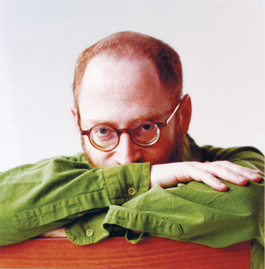home | metro santa cruz index | the arts | visual arts | review

Student of Greatness: Pulitzer Prize-winning composer Aaron Jay Kernis performs his own works and works by classical composer Terry Riley Saturday at UCSC.
Avant Garde Night at the U
Pulitzer Prize-winning classical composer Aaron Jay Kernis heads to UCSC.
By Alex Gilrane
In the summer of 1991, Neil Young startled the rock music world when he chose the art-punk band Sonic Youth as his opening act for a three-month national tour. Young was an icon of California folk-rock, while Sonic Youth epitomized the gritty New York scene. It seemed an odd match at the time, but it wound up showcasing the deep connections that linked the bands.
Saturday night's remarkable pairing of works by the classical composers Terry Riley and Aaron Jay Kernis doubtless appears similarly baffling to many aficionados of contemporary classical music—and it is likely to prove similarly enlightening.
Riley, a longtime Californian, is credited with inventing Minimalism, which became a major subgenre of classical music following his In C in 1964, and went on to profoundly influence virtually every composer of our time. Kernis, who is very much based in New York, is beloved in many circles as the composer who helped rescue classical music from both the avant-garde dissonance and hyperintellectual Minimalism that dominated the scene for decades.
New Music Works, which opens its fall season with the mashup, is playing up the contrast between the two composers. "The musical worlds of New Yorker Aaron Jay Kernis and Californian Terry Riley," reads a note accompanying NMW's press materials, "are as far apart aesthetically as they are geographically."
Kernis, who will be here to perform two of his works, recognizes the obvious contrast between his and Riley's biographies. But he sees nothing incongruous about the match. In a telephone interview last week, he described a deep musical connection with Riley.
Rather than a reaction against Minimalism, Kernis says, his approach to composition is directly linked to the highly mathematical, "process-driven" music Riley and others were writing 20 years ago.
"When I was a student, back in the '80s, living in New York and also, for a while, in San Francisco, I felt intensely aware of all of the music around me," he says. "And I was very much reacting to what I was hearing at that time. I was very interested in 'serial music,' and in fact took some elements of it for my own work.
"What was missing in some of it, for me, was lyricism, melody. I was looking for an approach to harmony that was more personal—a narrative-driven approach rather than a process-driven approach. I wanted to make my melodic spectrum wider."
Ultimately, Kernis says, he sees the Minimalists as his musical forebears. "I'm very much a post-Minimalist." While he is eager to dispel the myth that his work is an essential rejection of the late-20th-century avant-garde, he also points out that Riley has come a long way since his early works.
"Certainly, for my part, I haven't thought of him as a Minimalist for some time," Kernis says. "Especially in some of the longer works. The same is true for virtually all of the early Minimalists—certainly John Adams—while there are elements of Minimalism, some of them have become major maximalists!"
The bridge between the two composers is the esteemed guitarist David Tanenbaum. He will perform on two Riley pieces, including one, Quando Cosas Malas Caen del Cielo (When Bad Things Fall From the Sky), that approaches something like "maximalism" over the course of its three movements. Riley wrote the piece as a work of "community service" rather than going to jail after being arrested for a protest against the war in Iraq. According to the program notes, the piece begins with "the energy and spirit" of the peace march, moves on to suggest Riley's loneliness in jail and his determination to continue, and concludes with "a profound meditation on war ... and the feelings Riley had when the bombs started falling on the first day of the war."
Tanenbaum will join the composer (on piano) along with Ann Moss (soprano) and Axel Strauss (violin) for Kernis' Two Awakenings and a Double Lullaby, a recent work inspired by the birth of Kernis' twins, which references the number 2 in various ways that might reflect a quasi-Minimalist affection for mathematics. Two Awakenings is accompanied by meditations on light and birth.
The evening's six pieces together offer a glimpse of the vast range of musical and emotional territory that these two composers have separately charted over their careers—a map of at least two musical worlds.
KERNIS AT THE KEYS: THE MUSIC OF AARON JAY KERNIS AND TERRY RILEY, plays Saturday, Oct. 6, at 8pm (7:15pm pre-concert talk with Aaron Jay Kernis and Philip Collins) at Music Center Recital Hall, UCSC, 1156 High St., Santa Cruz. $10 students/$15 seniors/$18 general. 831.459.2159.
Send a letter to the editor about this story.
|
|
|
|
|
|